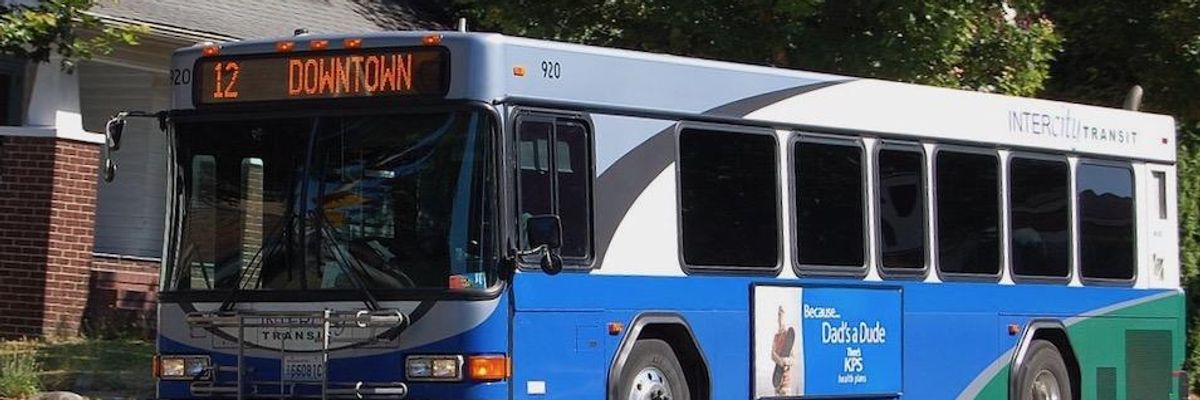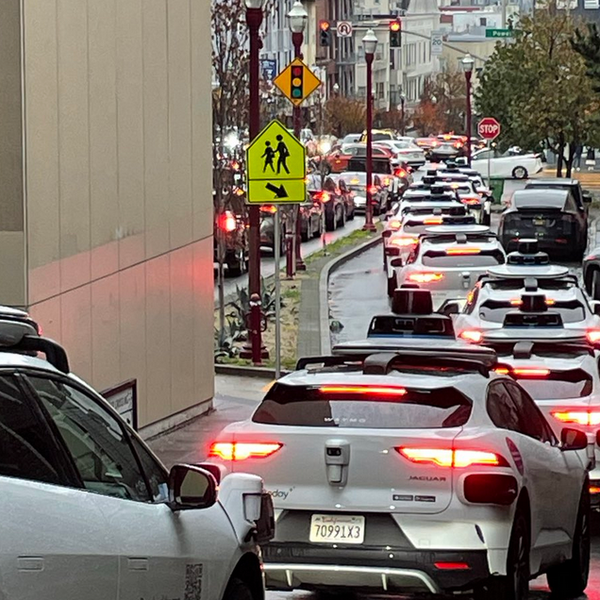
Intercity Transit Bus 902 on Route 12 to downtown Olympia. (Photo: Bluedisk/cc)
Move by Olympia, Washington to Create 'Zero Fare' Public Transit Called a 'Beautiful Thing'
City is latest in the country to offer publicly-funded transportation for residents and visitors.
Public transit in the Washington state capitol Olympia and surrounding areas is free at point of service as of January 1 as the region's Intercity Transit pilots a "zero fare" program through the next five years.
"It's a beautiful thing," bus rider Nate Hooks told Oregon Public Broadcasting (OPB).
The change reportedly came after the transit system mulled over the best way to continue to collect fares and found that the cost of upgrading collections machines outweighed the benefits of the revenue.
According to the Olympian:
[Intercity Transit] says fares currently net less than 2 percent of its operating revenue, while replacing an outdated fare collection system would cost at least $1 million.
Instead, the system decided to fund the "zero fare" approach to riders by increasing sales taxes in the Olympia-Lacey-Tumwater tricity area serviced by Intercity Transit.
"It costs a lot of money to collect money, which is surprising to a lot of people," the system's general manager Ann Freeman-Manzanares told OPB. "Looking at the broad list of things the community wanted us to address--in terms of access, equity, speed, reliability, addressing the environment, making sure that we're as efficient as possible--the combination of those things actually led us to zero-fare."
All services by the transit system save vanpool rides are fare-free.
Intercity Transit says that it is using the term "zero-fare" because the rides are already paid for by taxes, including a bump for the purpose of providing free-at-point-of-service approved by voters in 2018.
Olympia joins a number of other cities and municipalities in the U.S. experimenting with fare-free rides. As Common Dreams reported, Missouri's Kansas City approved a measure to that effect on December 5.
Mitchel Patrick Irons, a transit rider, told OPB that the new policy would be materially helpful to him.
"It will make a big difference in a lot of ways," said Irons. "I'm used to not having what you need in life, let alone what you want. I think it is great having a little more money."
An Urgent Message From Our Co-Founder
Dear Common Dreams reader, The U.S. is on a fast track to authoritarianism like nothing I've ever seen. Meanwhile, corporate news outlets are utterly capitulating to Trump, twisting their coverage to avoid drawing his ire while lining up to stuff cash in his pockets. That's why I believe that Common Dreams is doing the best and most consequential reporting that we've ever done. Our small but mighty team is a progressive reporting powerhouse, covering the news every day that the corporate media never will. Our mission has always been simple: To inform. To inspire. And to ignite change for the common good. Now here's the key piece that I want all our readers to understand: None of this would be possible without your financial support. That's not just some fundraising cliche. It's the absolute and literal truth. We don't accept corporate advertising and never will. We don't have a paywall because we don't think people should be blocked from critical news based on their ability to pay. Everything we do is funded by the donations of readers like you. Will you donate now to help power the nonprofit, independent reporting of Common Dreams? Thank you for being a vital member of our community. Together, we can keep independent journalism alive when it’s needed most. - Craig Brown, Co-founder |
Public transit in the Washington state capitol Olympia and surrounding areas is free at point of service as of January 1 as the region's Intercity Transit pilots a "zero fare" program through the next five years.
"It's a beautiful thing," bus rider Nate Hooks told Oregon Public Broadcasting (OPB).
The change reportedly came after the transit system mulled over the best way to continue to collect fares and found that the cost of upgrading collections machines outweighed the benefits of the revenue.
According to the Olympian:
[Intercity Transit] says fares currently net less than 2 percent of its operating revenue, while replacing an outdated fare collection system would cost at least $1 million.
Instead, the system decided to fund the "zero fare" approach to riders by increasing sales taxes in the Olympia-Lacey-Tumwater tricity area serviced by Intercity Transit.
"It costs a lot of money to collect money, which is surprising to a lot of people," the system's general manager Ann Freeman-Manzanares told OPB. "Looking at the broad list of things the community wanted us to address--in terms of access, equity, speed, reliability, addressing the environment, making sure that we're as efficient as possible--the combination of those things actually led us to zero-fare."
All services by the transit system save vanpool rides are fare-free.
Intercity Transit says that it is using the term "zero-fare" because the rides are already paid for by taxes, including a bump for the purpose of providing free-at-point-of-service approved by voters in 2018.
Olympia joins a number of other cities and municipalities in the U.S. experimenting with fare-free rides. As Common Dreams reported, Missouri's Kansas City approved a measure to that effect on December 5.
Mitchel Patrick Irons, a transit rider, told OPB that the new policy would be materially helpful to him.
"It will make a big difference in a lot of ways," said Irons. "I'm used to not having what you need in life, let alone what you want. I think it is great having a little more money."
Public transit in the Washington state capitol Olympia and surrounding areas is free at point of service as of January 1 as the region's Intercity Transit pilots a "zero fare" program through the next five years.
"It's a beautiful thing," bus rider Nate Hooks told Oregon Public Broadcasting (OPB).
The change reportedly came after the transit system mulled over the best way to continue to collect fares and found that the cost of upgrading collections machines outweighed the benefits of the revenue.
According to the Olympian:
[Intercity Transit] says fares currently net less than 2 percent of its operating revenue, while replacing an outdated fare collection system would cost at least $1 million.
Instead, the system decided to fund the "zero fare" approach to riders by increasing sales taxes in the Olympia-Lacey-Tumwater tricity area serviced by Intercity Transit.
"It costs a lot of money to collect money, which is surprising to a lot of people," the system's general manager Ann Freeman-Manzanares told OPB. "Looking at the broad list of things the community wanted us to address--in terms of access, equity, speed, reliability, addressing the environment, making sure that we're as efficient as possible--the combination of those things actually led us to zero-fare."
All services by the transit system save vanpool rides are fare-free.
Intercity Transit says that it is using the term "zero-fare" because the rides are already paid for by taxes, including a bump for the purpose of providing free-at-point-of-service approved by voters in 2018.
Olympia joins a number of other cities and municipalities in the U.S. experimenting with fare-free rides. As Common Dreams reported, Missouri's Kansas City approved a measure to that effect on December 5.
Mitchel Patrick Irons, a transit rider, told OPB that the new policy would be materially helpful to him.
"It will make a big difference in a lot of ways," said Irons. "I'm used to not having what you need in life, let alone what you want. I think it is great having a little more money."

